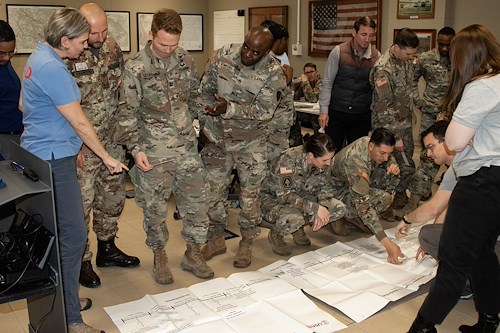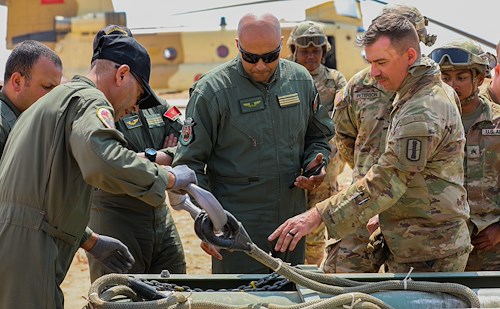Gallery contains 1 image
×
Photo 1 of 1
USAID hosts Joint Humanitarian Operations Course at SETAF-AF
Planners, logisticians, intelligence and operations officers, as well as public affairs and civil affairs Soldiers, many assigned to U.S. Army Southern European Task Force, Africa (SETAF-AF), tackle a disaster response case study during a joint humanitarian operations course in Vicenza, Italy, April 5, 2023. The U.S. Agency for International Development’s Bureau for Humanitarian Assistance hosts JHOCs regularly to provide instruction on military and civilian cooperation during disaster response operations. (U.S. Army photo by Maj. Joe Legros)
Photo by: Maj. Joe Legros
VICENZA, Italy – “The one thing we’re all looking for is unified action,” said U.S. Army Col. Robert Summers, chief of plans (G5), U.S. Army Southern European Task Force, Africa (SETAF-AF). “If we synchronize our efforts, we can accomplish so much more.”
Summers delivered this opening address to a diverse group of planners, logisticians, intelligence and operations officers, as well as public affairs and civil affairs Soldiers, attending a joint humanitarian operations course (JHOC) at SETAF-AF, April 4-5, 2023.
The two-day course was hosted by a team of U.S. Agency for International Development advisors specifically assigned to the agency’s Bureau for Humanitarian Assistance.
“We’ve literally taught thousands of these JHOCs to over 30,000 DoD personnel throughout the years,” said Matt Lonnquest, BHA’s humanitarian assistance advisor to the military at U.S. Africa Command. “The more we coordinate ahead of a natural or man-made disaster, the better our combined response will be.”
The need for multinational disaster response was brought to the forefront recently with Cyclone Freddy which impacted several areas in Africa, most heavily in Malawi and Mozambique.
Of the hundreds of disasters that occur worldwide, several countries in Africa, such as Mali, Sudan, Somalia, Ethiopia, Nigeria, Cameroon and Kenya, receive much-needed attention and assistance from USAID. These countries are impacted not just by cyclones, but other natural disasters including drought and flooding. Multinational response teams also address man-made crises such as refugees and internally displaced persons resulting from violent extremist activity and political unrest.
SETAF-AF is responsible for achieving U.S. Africa Command and U.S. Army Campaign Plan objectives while conducting all U.S. Army operations, exercises and security cooperation on the African continent.
A critical element of SETAF-AF's effort is crisis response.
“Disaster response is one of the more likely missions SETAF-AF Soldiers will receive,” said U.S. Army Brig. Gen. Brian T. Cashman, SETAF-AF deputy commanding general, who delivered the culminating address. “Courses like JHOC and regularly conducted joint exercises are essential for maintaining readiness.”
The course provided participants a greater understanding of U.S. foreign disaster response, the necessary coordination between different levels of government and non-governmental organizations (NGOs), and how the joint force responds when called into action.
Just as the U.S. would not be the only nation to respond when disaster hits, it was not the only country represented at the course.
"We have the same goals: to save lives, mitigate suffering and reduce the economic impact of disasters,” said Italian Armed Forces Sgt. Maj. Andrea Lustrino, a civil-military cooperation (CIMIC) Soldier and participant in the JHOC.
CIMIC Soldiers often enter a disaster area at the request of the host nation, conduct assessments to determine needs, then work together with local and regional organizations to meet those needs in the best and most efficient way.
“This is actually something just as important as the money donated for disaster relief,” said Italian Armed Forces Sgt. Maj. Giuseppe Bonaventura, Lustrino’s fellow CIMIC Soldier. “We must coordinate with the host nation government and NGOs to continually monitor the situation. Cooperation and continually communicating help ensure a successful response.”
BHA instructors emphasized that the DoD is only called upon for a fraction of the disasters which occur each year.
“Humanitarians are bound by the principles of humanity, neutrality, impartiality and independence,” said Lonnquest. “For these reasons, we determine when it makes sense to call upon the DoD. Sometimes their unique capabilities are exactly what we need for a successful response.”
BHA will only respond when a disaster is beyond the ability of the impacted country to respond adequately. The host government must also request assistance or be willing to accept it. Additionally, Lonnquest indicated it must be in the U.S. government’s best interest to respond.
The BHA overcomes concerns about neutrality and impartiality by utilizing NGOs and other international organizations (IOs) during disaster response and humanitarian assistance projects. NGOs and IOs employ personnel on the ground to interact directly with the host nation’s local, regional and national responders.
Military response can be found in numerous disaster response situations to include Typhoon Haiyan in The Republic of the Philippines, Hurricane Dorian in Haiti, as well as in post-civil war Liberia.
“There are certain occasions when a disaster requires immediate attention,” said Lonnquest. “Under those dire circumstances, calling the military makes the most sense.”
To illustrate this concept further, JHOC instructors provided participants several real-world case studies, including the most recent Liberian civil war, which ended in 2003. The class separated into four teams of approximately 10 students each, tackling how best to respond from a multinational perspective.
“Growing up in nearby Ivory Coast (Côte d'Ivoire), I remember how tragic the situation was in Liberia,” said U.S. Army Sgt. Salfo Konkobo, a contract specialist with the 414th Contract Support Battalion, and JHOC participant. “After their civil wars, there were thousands of child soldiers, displaced citizens and an entire country to repair.”
After 14 years of civil war, factions included Liberian political and military groups all vying for power, tens of thousands of internally displaced persons, over 20,000 child soldiers and approximately 340,000 refugees returning to their country. Infrastructure such as roads, plumbing and electricity all needed attention.
This was a prime example of where military support was needed.
Among several NGOs and IOs such as the Red Cross and the World Food Program, the BHA also requested 2,500 U.S. Marines to provide immediate assistance, mostly from a security standpoint. Military support eventually evolved into a long-term commitment by establishing a relationship between the Michigan National Guard and the newly formed Armed Forces of Liberia (AFL) through the National Guard Bureau’s State Partnership Program.
“Whereas many disasters are rapid onset situations like flooding or volcano response, Liberia definitely falls into the complex emergency category,” said Lonnquest.
From repatriation and food security to infrastructure repair and police assistance, the BHA response was comprehensive. The inclusion of DoD in the process was critical to Liberia’s recovery, especially in terms of regional security and medical care, areas where the country still benefits from ongoing exchanges between the AFL, the Michigan National Guard and SETAF-AF.
“To achieve a successful disaster response, communication is needed early and often,” said Lonnquest. “The more we can coordinate prior to an emergency, the better.”
“That’s why these courses are so important,” he concluded.







